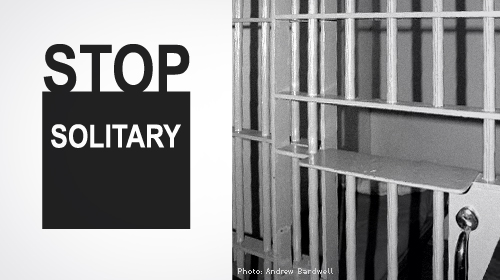
Over 30,000 prisoners in California have refused food to protest it. Innocent men freed from death row report that it drives people insane, killing everything inside of them before they ever see the execution gurney. Architects have called for an end to building the tiny cement cages used for it. And the UN has said it can amount to torture.
But still 80,000 people across the country are locked in solitary.
Several states worked to end the practice this year. Some succeeded. Below is the 2013 solitary confinement scorecard.
Citing Budget Woes, Two States Shut Down Facilities Where Men Were Sent to Disappear
Some of the biggest news in solitary this year was the closing of two "supermax" facilities – Tamms and Colorado State Penitentiary II – that held prisoners in complete isolation, some for decades.
Nevada No Longer Allows Kids to Be Locked Alone for Longer Than 72 Hours
Nevada successfully enacted a bill that places some restrictions on the isolation of youth in juvenile facilities. The law requires that a facility exhaust all less-restrictive options before placing children in isolation, limits the purpose of isolation, and commissions a study of segregation across the state. Nevada's new law will hopefully be a first step to eliminating the solitary confinement of children in the state.
Texas to Take an Honest, Comprehensive Look at Solitary throughout the State
Texas passed a bill requiring data collection to track the number of prisoners, both juveniles and adults, in disciplinary seclusion and the length of placement. The law also requires a review and report of administrative segregation throughout the state.
State that Locks Up the Most Kids Gets Close to Limiting Hours Spent Alone
Florida confines more youth under age 18 in its adult prisons than any other state, and some of them are subjected to solitary confinement, despite the growing scientific evidence of the severe psychological impact of solitary on young people's minds. However, SB 812 marked a significant step in the right direction; the bill, which ultimately did not pass, would have regulated the isolation of youth under 18 in adult facilities and limited the length of confinement. As proposed, the bill would have also limited "emergency isolation" of juveniles to 24 hours and "disciplinary cell confinement" to 72 hours for those found guilty of a major rule violation. In addition, the bill would have required out-of-cell exercise for juveniles in disciplinary cell confinement and protective custody to counteract the effects of physical isolation.
State that Has Sentenced Prisoners to Nearly a Decade of Segregation Proposed Limits and Positive Changes
In Massachusetts, prisoners can be sentenced to spend up to 10 years in solitary confinement for disciplinary offenses. However, the legislature is considering two bills (one in the House and one in the Senate) that would limit disciplinary segregation terms to six months, require regular review hearings, and provide for basic humane conditions for all prisoners in segregation or isolation units – light, ventilation, clothing, sanitary facilities, regular meals, medical and mental health treatment, access to personal property, visitation and communication rights, at least one hour per day of out-of-cell time, and the opportunity to participate in positive programs.
The Momentum for Change is Growing across the Country
These legislative reforms highlight a growing recognition of the need to limit solitary confinement. In addition to the states above, others like California, Montana, and New Hampshire, as well as the federal government, have also considered legislation that would limit the use of isolation, specifically for youth or the mentally ill, or are now reviewing the over-use of solitary confinement in their jurisdiction. We have seen undeniable progress in the 2013 legislative cycle, but more remains to be done on behalf of the 80,000 prisoners still subject to extreme and damaging isolation. The ACLU and advocates across the country are now gearing up to continue this important work in 2014.
Learn more about solitary confinement and other civil liberties issues: Sign up for breaking news alerts,follow us on Twitter, and like us on Facebook.

